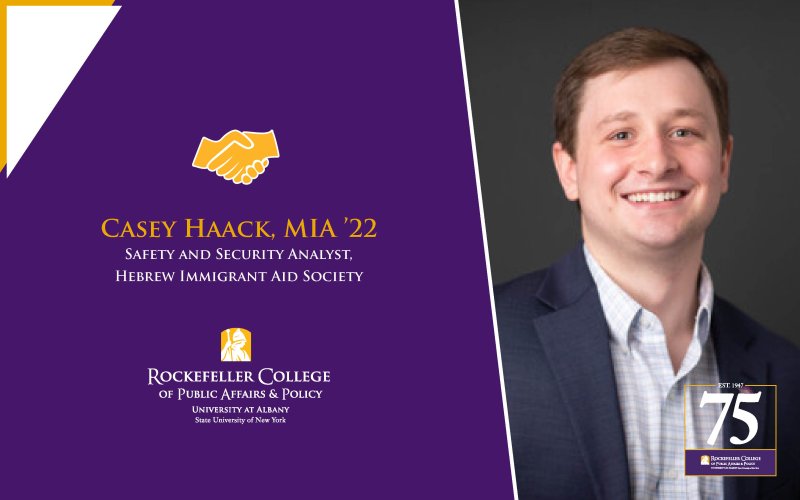Rock Your Career: Casey Haack, MIA ’22

What was one of the most meaningful experiences you had during your time in the MIA program?
I can’t directly identify a particular experience that best sums up my time at Rockefeller. However, I felt as though the diversity of thought and culture presented by faculty and students really strengthened the program. I was able to learn from professors who worked for the CIA and Department of Defense, had interviewed members of the Taliban, and published numerous works in the field of international affairs. Furthermore, I met and exchanged ideas with students from the DRC, Afghanistan, India and elsewhere. This really expanded my worldview and encouraged me to view global events from a new perspective.
Where did you complete your internship requirement and what knowledge, skills, and abilities did you develop as a result of this experience?
I completed my internship requirement with the NYS Education Department’s Information Security Office and the NYS Division of Homeland Security and Emergency Services. While with the Information Security Office, I acquired a host of technical skills pertaining directly to cybersecurity. This included familiarizing myself with software such as STIX, TAXII, and Nessus. With DHSES I worked with the Office of Counterterrorism and the Office of Fire Prevention and Control. In those roles, I had to employ the use of memo drafting, data cleaning, and learn to create visualizations through Tableau. In both roles I gained valuable experience with members of the intelligence community and helped to strengthen my resume for future full-time employment.
What specific skills or experiences through the program have prepared you for your transition to post-graduate employment?
Throughout the duration of the MIA program, I continuously acquired a number of skills that helped me during my job search. Primarily, this stems from two main sources: hard work and exposure to useful information. The MIA program focuses heavily on reading, writing, and participation. I was constantly skimming articles, drafting long essays, and encouraged to engage with my professors and cohort. This equipped me with a knowledge foundation that I was able to reference during interviews. For instance, the work I did in my Intelligence Analysis and Statistics classes were directly referenced in my conversations with employers. I was able to detail the intelligence cycle, highlight examples of my work with data, and explain key points of modern security issues.
Where are you currently employed and what is the focus of your position?
The opportunities that I searched for after graduating were mostly in the security sector. The roles that I applied to ranged from Intelligence Analyst to Global Security Analyst. Currently, I am employed by the Hebrew Immigrant Aid Society as a Safety and Security Analyst. The role will see me maintaining an incident reporting platform, analyzing national security and political trends, and briefing leadership on security matters.
What advice do you have for students who are considering employment in the public sector and pursuing an MIA degree?
The advice that I would give to prospective students is to fully engross themselves in the program. This can be accomplished by participating in class discussions, completing assigned readings, and by utilizing the support made available through the department. For example, I was able to totally retool and strengthen my resume by leveraging the Career Center, found internships through the distribution of the resume books, and built relationships with professors who I was able to later use as references. In terms of navigating the current job market, I found that it pays to not get discouraged and to be persistent. I applied to countless jobs for several months before landing a role that I felt comfortable with. It takes time and effort, but in the end, I was extremely happy with where I landed.


